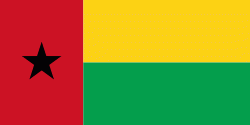Buba
Buba is the largest city in southern Guinea-Bissau, lying on the Rio Grande de Buba, near the Contanhez National Park. It has a population 6,815 (2008 est).
During his presidency, former President of Guinea-Bissau Kumba Yala planned to move the capital city to Buba. Those plans have been dropped since he was deposed in a coup d'état. Construction is under way for a deepwater port that could host three 70-tonne vessels at any given time. It is being built by Angola Bauxite in order to export bauxite.
The Portuguese constructed an army camp in Buba, which, shortly after independence, was used as the headquarters for a Dutch Foreign Aid Project aimed at providing the villages of Quinara and Tombali with safe drinking water. The construction of a plywood factory through Swedish Foreign Aid in 1982 boosted the economy and growth of Buba, as it installed a steam engine which produced enough electricity to supply the whole town.
During his presidency, former President of Guinea-Bissau Kumba Yala planned to move the capital city to Buba. Those plans have been dropped since he was deposed in a coup d'état. Construction is under way for a deepwater port that could host three 70-tonne vessels at any given time. It is being built by Angola Bauxite in order to export bauxite.
The Portuguese constructed an army camp in Buba, which, shortly after independence, was used as the headquarters for a Dutch Foreign Aid Project aimed at providing the villages of Quinara and Tombali with safe drinking water. The construction of a plywood factory through Swedish Foreign Aid in 1982 boosted the economy and growth of Buba, as it installed a steam engine which produced enough electricity to supply the whole town.
Map - Buba
Map
Country - Guinea-Bissau
 |
 |
| Flag of Guinea-Bissau | |
Guinea-Bissau was once part of the kingdom of Kaabu, as well as part of the Mali Empire. Parts of this kingdom persisted until the 18th century, while a few others were under some rule by the Portuguese Empire since the 16th century. In the 19th century, it was colonised as Portuguese Guinea. Portuguese control was restricted and weak until the early 20th century with the pacification campaigns, these campaigns solidified Portuguese sovereignty in the area. The final Portuguese victory over the remaining bastion of mainland resistance, the Papel ruled Kingdom of Bissau in 1915 by the Portuguese military office Teixeira Pinto, and recruited Wolof mercenary Abdul Injai was the event to solidify mainland control. The Bissagos, islands off the coast of Guinea-Bissau, were officially conquered in 1936, ensuring Portuguese control of both the mainland and islands of the region. Upon independence, declared in 1973 and recognised in 1974, the name of its capital, Bissau, was added to the country's name to prevent confusion with Guinea (formerly French Guinea). Guinea-Bissau has a history of political instability since independence, and only one elected president (José Mário Vaz) has successfully served a full five-year term. The current president is Umaro Sissoco Embaló, who was elected on 29 December 2019.
Currency / Language
| ISO | Currency | Symbol | Significant figures |
|---|---|---|---|
| XOF | West African CFA franc | Fr | 0 |
| ISO | Language |
|---|---|
| PT | Portuguese language |















